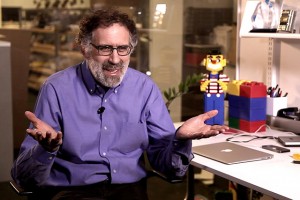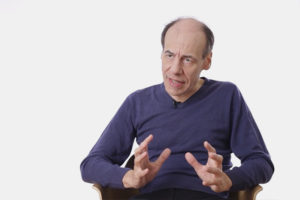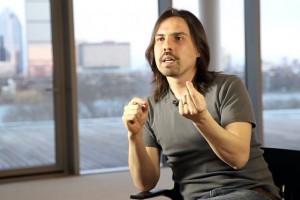Daylong Learning
Professor Mitchel Resnick on computer clubhouses for kids, principles of effective learning and designing, and...
The idea of the end of knowledge at least in English is a very mixed term, ambiguous term. In the first instance it is normally understood as the terminal point, where things come to completion, but also end means the goal. In some sense there is a kind of complete, it’s not just that it’s ended in the sense of finished, but that something that you were trying to do has been completed. So, there’s a kind of teleological understanding of end as well. These two notions of end coexist not only in English, but in many languages ambiguously. I want to play on that ambiguity, becausewhen we talk about the end of knowledge, a part of what you might say drives the goal- if you think about knowledge of having a goal – is the fact that we’re kind of limited in the way that we have to think about what it is exactly we’re trying to do, when we’re producing knowledge.
This has been very much part of my work from the early period, where I actually wrote a book that was published 25 years ago called “Philosophy Rhetoric and the End of Knowledge”. This was in 1993 and in more recent years I’ve been talking about transhumanism and post-humanism, and things of that kind. This has something to do with the end of knowledge as well. What connects these two projects is the idea that a part of what we want to talk about, when we talk about the end of knowledge, is some about the nature of the human condition and where it’s going. Because knowledge is such a big deal in philosophy, because in some sense it’s regarded as the point at which our humanity – or whatever it is that makes us what we are – is most clearly exemplified, what we know is in a sense who we are, at least in terms of how we relate to each other.
While one can kind of quarrel about the this in various ways, nevertheless, I think, when one talks about the kind of knowledge that one thinks is worth promoting, you’re saying something about the person. I believe that very clearly. One of the problems I would say with modern theories of knowledge, especially after Kant, it has been that there’s been this tendency to think about knowledge in a very abstract way, which is to say detached from the bearers and producers, and consumers of that knowledge. In other words, we talk about what is true as such, what we should believe as such, without really thinking much about who are these people, who are the believers in the truth, who are they, what are they, what kind of beings are they.
My concern about the end of knowledge comes from this kind of idea, namely that academic philosophy tend to treat epistemology in a very abstract way. To just put it very succinctly, in philosophy there is a strong distinction drawn still between epistemology and ontology. Ontology is about the nature of being in the world and epistemology is the nature of knowing, and these are treated as separate. From my standpoint it’s hard to know what we should know, unless we know what kind of being we are and what would be appropriate for a being of our kind to know. There’s a big issue here that’s opened up.
When we talk about the end of knowledge in this context, then we have to start with humans as the beings who are the knowers. We’ve got two options. One option is that if we’re trying to improve the nature of our knowledge, we are trying to make people better knowers, make them smarter, etc. When we say that we want to make people better, smarter knowers, we’re starting with the assumption that the people we’re working with are fixed, in other words, that they’ve got a certain kind of capacity.
I think this is very much true of classical epistemology, that you imagine a kind of Cartesian knower, an individual who’s a mortal human being with its capacities that we normally think about. Then we’re trying to talk about how do we improve the capacities of those people, who are like that, who are Homo sapiens, maybe Homo sapiens who are a bit enhanced in some way with technology, or something like that, but basically individual Homo sapiens.
What we’re not talking about, when we talk about the end of knowledge normally, is the idea of making better people. Making people better is what I was saying before. Now I’m talking about making better people. So, there’s a difference, these are quite different things. Because what we’re talking about then is that, if we actually want to improve the way in which we know the world, we may have to do something to ourselves in a very fundamental way in order to be in that position to know the world. This is a move from making people better to making better people.
This is a very controversial idea. I’m not the person who has invented this idea, but I’m putting this on the table, because when we talk about the end of knowledge there is an open question about the ontology of the knower – who is the knower? As I say, classical epistemology assumes that it’s individual Homo sapiens, and individual Homo sapiens and gathered together, and so forth. That’s how knowledge is produced. Then there’s a question of maybe we need a kind of better knower. There are lots of ways of thinking about this. This is where issues of transhumanism come in. In recent years I’ve been writing about this idea.
Transhumanism is the idea that if we want to realize the kinds of interests and concerns that have animated the idea that we should know as much as we can and understand the entire universe and the cosmos, and the sort of thing that you know physics and many of the other science is still aspire to, that if we really want to take that kind of idea seriously, then we need to be a different sort of being. In other words the idea of what we’re trying to do is fine, the problem is we’re not up to the task the way we are, and that means an ontological change.
This is where I have been exploring in the last ten years – the issues of transhumanism, what would it what would be the relevant forms of enhancement for human beings to be able to actually live up to the normative standards, that classical philosophy is put forward? And not just classical philosophy, but also physics as we understand it today. Physicists are still pursuing this idea, this is not just some kind of illusion that people came up with, it’s still very much part of modern science. The question becomes: how do we become the kind of being, who could in principle understand everything?
Part of what I’ve looked at in this regard – and it’s just something that I have begun looking at in the last few years – is, of course, this movement within Russia called the Cosmos movement. Russian cosmism starting with Fyodorov and Vernadskiy – all these people from the 19th and 20th centuries, who were imagining that human beings were not just limited by how they began biologically, but in a sense have this kind of cosmic purpose.
I think this kind of ontology that’s implied with cosmism is in fact very much along the lines of what contemporary transhumanism is trying to propose. While people in the West have not really taken on board much of this cosmos stuff yet, nevertheless, I think, in the long term this will be seen as very much ahead of the curve, if we want to take seriously the aspirations and goals, which even contemporary physics still strives for, which is a kind of unified comprehensive understanding of universe.
I think that when we think about the end of knowledge, my own standpoint, which makes it different from a lot of other people’s standpoint, is I’m willing to take quite seriously the more extreme claims that have been made about humans capacity to know things, but I think that the price of that is that we will need to change the kind of being we are materially.

Professor Mitchel Resnick on computer clubhouses for kids, principles of effective learning and designing, and...

Philosopher and sociologist of science Steve Fuller on collective and individualistic nature of knowledge, eli...

Economist Cesar Hidalgo on the meritocratic system, rock star behavior, and market mechanisms